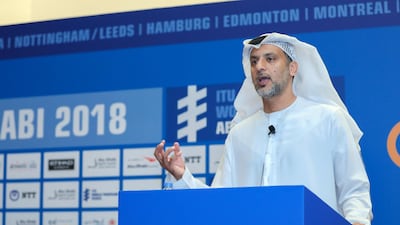Teachers in the UAE will receive training to help prepare them for the integration of more children with intellectual disabilities into mainstream schools, an education conference heard.
At the Qudwa Forum in Abu Dhabi, experts praised a nationwide focus on adopting an inclusive approach to people with disabilities – widely referred to as 'people of determination' in the Emirates – both in schools and wider society following the success of the Special Olympics earlier this year.
However, some teachers raised concerns that they do not have the skills to teach children whose conditions can lead to challenging behaviour.
Talal Al Hashemi, national director of Special Olympics UAE, said a training programme had been rolled out to 100 teachers earlier this year but that a far wider initiative would be launched “soon”.
"It will focus on teachers, technical staff, administrative staff, even school guards, bus drivers – all the jobs at the school system will be receiving training in this regard," he said.
"We want teachers in particular to be fully aware of this. We want teachers to receive these training courses.
"There is another side – it’s the volunteerism side. The programmes we have for people of determination are many and numerous. If you follow up on the Special Olympics Foundation you will see that there are many voluntary programmes and volunteering programmes in which you can develop your skills.”
Disabled children had a right to be included, he said.
The Unified Champion Schools programme, backed by the Special Olympics and designed to promote inclusion, is being introduced at all public schools in the UAE.
Ghada Nanaa, 64, a teacher at Scholars International School in Sharjah who has taught French in the UAE for 30 years, said she supported the policy of integration but said that some teachers would need help to be able to teach the new members of their classes effectively.
In a question-and-answer session, she told a panel that the authorities “should help us”, pointing out that training programmes had previously been held for teachers around topics such as national identity.
Ms Nanaa told The National that she had been reassured that a training programme would be introduced soon.
"Some children don't like high voices, some don't like certain activities," she said.
“We have to have more help, especially the private schools. And it is a big challenge for language classes.
"We are warm people, we want to do this but we have to do it effectively and we need more help and more training."
At Sunday's event, teachers were given advice on how they could include children with intellectual disabilities in mainstream classes.
Prof Eman Gaad, dean of the faculty of education at The British University in Dubai, said that while a child in a geography lesson may not be able to name every capital city, they could hold a globe at the front of class, which would be a “meaningful, interactive experience”.
"The last thing we need to do is include a child and then not know what to do with him," Prof Gaad said.
"The best thing to do is include a child, then support. It is very important to create this understanding that having the child of determination inside my classroom is [their] right.
"It is not a duty, not a gift, not because I am a good person, it is his right. We live in a land where we have the legislation to support this right.
"So whether we like it or not, we need to include this child right here, right now and make sure he has a meaningful experience.”

